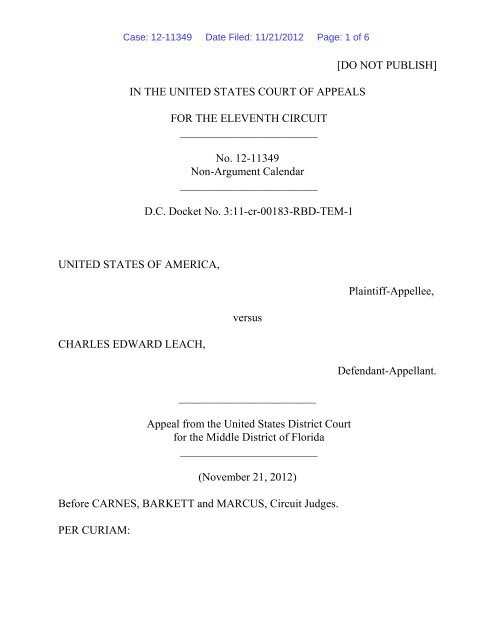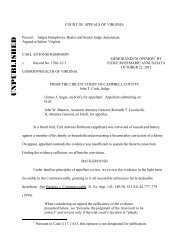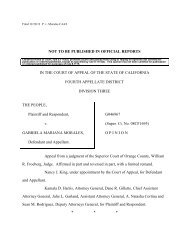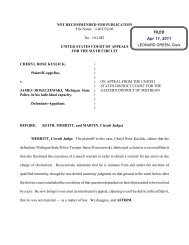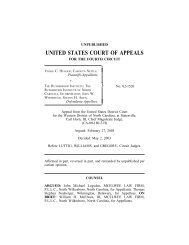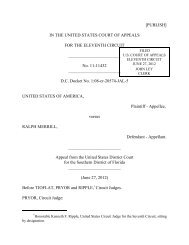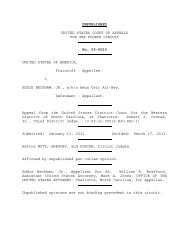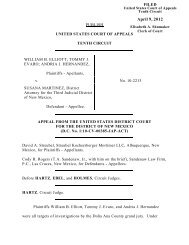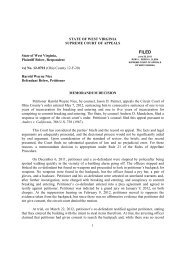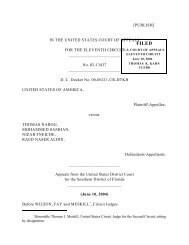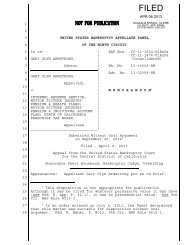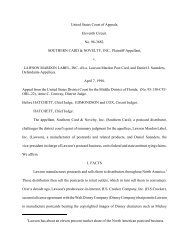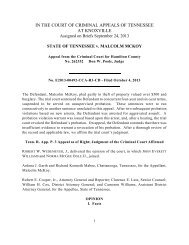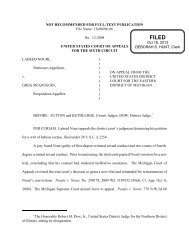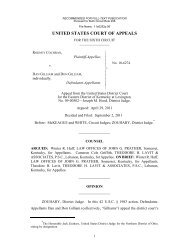view - Court of Appeals - 11th Circuit
view - Court of Appeals - 11th Circuit
view - Court of Appeals - 11th Circuit
Create successful ePaper yourself
Turn your PDF publications into a flip-book with our unique Google optimized e-Paper software.
Case: 12-11349 Date Filed: 11/21/2012 Page: 1 <strong>of</strong> 6<br />
IN THE UNITED STATES COURT OF APPEALS<br />
FOR THE ELEVENTH CIRCUIT<br />
________________________<br />
No. 12-11349<br />
Non-Argument Calendar<br />
________________________<br />
D.C. Docket No. 3:11-cr-00183-RBD-TEM-1<br />
[DO NOT PUBLISH]<br />
UNITED STATES OF AMERICA,<br />
CHARLES EDWARD LEACH,<br />
llllllllllllllllllllllllllllllllllllllllPlaintiff-Appellee,<br />
versus<br />
llllllllllllllllllllllllllllllllllllllllDefendant-Appellant.<br />
________________________<br />
Appeal from the United States District <strong>Court</strong><br />
for the Middle District <strong>of</strong> Florida<br />
________________________<br />
(November 21, 2012)<br />
Before CARNES, BARKETT and MARCUS, <strong>Circuit</strong> Judges.<br />
PER CURIAM:
Case: 12-11349 Date Filed: 11/21/2012 Page: 2 <strong>of</strong> 6<br />
Charles Leach appeals his conviction for manufacturing marijuana, in violation<br />
<strong>of</strong> 21 U.S.C. § 841, and conspiracy to manufacture marijuana, in violation <strong>of</strong> 21<br />
U.S.C. § 846. On appeal, Leach argues that the district court erred in denying his<br />
motion to suppress the evidence gathered pursuant to a search <strong>of</strong> his residence,<br />
because the agents included deliberate falsehoods and omitted material information<br />
in applying for the search warrant. After careful re<strong>view</strong>, we affirm.<br />
We re<strong>view</strong> whether an affidavit in support <strong>of</strong> a search warrant established<br />
probable cause de novo and findings <strong>of</strong> historical fact for clear error. United States<br />
v. Lopez, 649 F.3d 1222, 1245 (<strong>11th</strong> Cir. 2011). We construe all facts in the light<br />
most favorable to the party who prevailed below. United States v. Ramirez, 476 F.3d<br />
1231, 1235-36 (<strong>11th</strong> Cir. 2007).<br />
Affidavits supporting arrests warrants are presumptively valid. Franks v.<br />
Delaware, 438 U.S. 154, 171 (1978). For a search warrant to be valid, it must be<br />
supported by probable cause. U.S. Const. amend. IV (providing that “no Warrants<br />
shall issue, but upon probable cause . . . particularly describing the place to be<br />
searched . . . .”). “A sufficient basis for probable cause for a search exists when under<br />
the totality <strong>of</strong> the circumstances there is a fair probability that contraband or evidence<br />
<strong>of</strong> a crime will be found in a particular place.” Lopez, 649 F.3d at 1245 (quotation<br />
and alteration omitted). In determining probable cause, a court may consider only the<br />
2
Case: 12-11349 Date Filed: 11/21/2012 Page: 3 <strong>of</strong> 6<br />
information that had been presented to the issuing judge. United States v. Lockett,<br />
674 F.2d 843, 845 (<strong>11th</strong> Cir. 1982). Opinions and conclusions <strong>of</strong> experienced agents<br />
regarding a set <strong>of</strong> facts are a factor in the probable cause equation. United States v.<br />
Robinson, 62 F.3d 1325, 1331 n.9 (<strong>11th</strong> Cir. 1995).<br />
When considering an attack on the veracity <strong>of</strong> an affidavit filed in support <strong>of</strong><br />
a search warrant, the Supreme <strong>Court</strong> has held that (1) “where the defendant makes a<br />
substantial preliminary showing that a false statement knowingly and intentionally,<br />
or with reckless disregard for the truth, was included by the affiant in the warrant<br />
affidavit,” and (2) “if the allegedly false statement is necessary to the finding <strong>of</strong><br />
probable cause, the Fourth Amendment requires that a hearing be held at the<br />
defendant’s request.” Franks, 438 U.S. at 155-56. If, at the hearing, the defendant<br />
establishes the allegation <strong>of</strong> perjury or reckless disregard by a preponderance <strong>of</strong> the<br />
evidence, and “with the affidavit’s false material set to one side, the affidavit’s<br />
remaining content is insufficient to establish probable cause, the search warrant must<br />
be voided and the fruits <strong>of</strong> the search excluded to the same extent as if probable cause<br />
was lacking on the face <strong>of</strong> the affidavit.” Id. at 156.<br />
Concerning the first Franks prong, the attack on the affidavit supporting the<br />
warrant must contain “allegations <strong>of</strong> deliberate falsehood or <strong>of</strong> reckless disregard for<br />
the truth,” specifically pointing out the portion <strong>of</strong> the warrant affidavit that is claimed<br />
3
Case: 12-11349 Date Filed: 11/21/2012 Page: 4 <strong>of</strong> 6<br />
to be false. Id. at 171. The allegations should be supported by an <strong>of</strong>fer <strong>of</strong> pro<strong>of</strong>,<br />
including affidavits or sworn or otherwise reliable statements <strong>of</strong> witnesses;<br />
conclusory allegations <strong>of</strong> negligence or innocent mistakes are insufficient. Id. As for<br />
the second Franks prong, in order to be entitled to relief, a defendant must show that<br />
the misrepresentations or omissions were material, which means that, absent the<br />
misrepresentations or omissions, probable cause would have been lacking. United<br />
States v. Novaton, 271 F.3d 968, 987 (<strong>11th</strong> Cir. 2001).<br />
In this case, the district court found two inaccuracies in the affidavit: (1) that<br />
Leach’s landlord, Nancy Savage, requested both verbally and in writing that a<br />
security check <strong>of</strong> the residence be performed; and (2) that upon approaching the<br />
residence to conduct the security sweep, agents could smell the odor <strong>of</strong> raw flowering<br />
marijuana coming from the residence. Both <strong>of</strong> these statements contained in the<br />
affidavit were in conflict with the testimony at the suppression hearing because, first,<br />
the evidence showed that the agents had requested consent for the security check<br />
from Savage (and not the other way around), and second, the evidence showed that<br />
the agents had smelled marijuana immediately upon approaching the gate to the<br />
Leach residence. Additionally, the district court identified two omissions in the<br />
affidavit: (1) that the agents entered the residence during the security sweep and<br />
found marijuana; and (2) that the agents saw a marijuana plant protruding from a<br />
4
Case: 12-11349 Date Filed: 11/21/2012 Page: 5 <strong>of</strong> 6<br />
1<br />
garbage bag outside the fence surrounding the residence. The district court did not<br />
make any specific findings about whether the inaccuracies and omissions at issue<br />
were made knowingly or recklessly. Rather, the district court found that the affidavit<br />
was sufficient even with the inaccuracies removed and the omissions added.<br />
We agree with the district court. Indeed, with the challenged inaccuracies<br />
removed and the omissions inserted, the affidavit reads this way:<br />
Upon receiving information from Drug Enforcement Administration<br />
Task Force Agent Daniel T. Wolfe that the suspect Charles Leach and<br />
his wife Kerri Leach where [sic] both observed at a local growth [sic]<br />
store purchasing items commonly used to grow marijuana on five<br />
different occasions. [sic] The subject had previously been involved in an<br />
indoor marijuana grow in 2007 in which Charles Leach served four<br />
months in Federal Prison. The Leach subjects have no rental agreement<br />
on the residence and are only living there to help out on the blue berry<br />
[sic] farm while residing there. The utility records indicate higher than<br />
normal usage starting on 06/23/2010 through the current date 12/1/2010.<br />
The agents entered the residence to conduct a security sweep during<br />
which they found marijuana. The agents also saw a marijuana plant<br />
protruding from a garbage bag outside the fence surrounding the<br />
residence.<br />
Based on this version <strong>of</strong> the affidavit, Leach has not shown that, absent the<br />
misrepresentations or omissions, probable cause would have been lacking.<br />
1<br />
The court also rejected as without merit Leach’s claim that the agents had intentionally<br />
misled the state court judge by telling the judge that the pattern <strong>of</strong> electricity usage from June to<br />
November 2010 demonstrated indoor growing cycles even though no one witnessed the Leaches<br />
purchasing the indoor growing equipment until October 2010. However, this evidence does not<br />
establish that the October date was the first time that they had purchased equipment and supplies<br />
for growing marijuana. In any event, Leach does not challenge the finding on appeal, and it is<br />
therefore abandoned. United States v. Jernigan, 341 F.3d 1273, 1283 n.8 (<strong>11th</strong> Cir. 2003).<br />
5
Case: 12-11349 Date Filed: 11/21/2012 Page: 6 <strong>of</strong> 6<br />
For starters, the issuing judge was entitled to rely on the agents’ conclusion that<br />
the store where the Leaches were seen purchasing equipment was considered a<br />
“growth store,” and that the items that they were purchasing were commonly used to<br />
grow marijuana. See Robinson, 62 F.3d at 1331 n.9. Likewise, the judge was also<br />
correct in relying on the agents’ implication that the high utility usage indicated a<br />
marijuana grow operation. These two facts, along with the fact <strong>of</strong> Leach’s prior<br />
conviction, which was clearly relevant, were sufficient to show a fair probability that<br />
evidence <strong>of</strong> marijuana cultivation would be found in the Leach residence. See Lopez,<br />
649 F.3d at 1245; see also Robinson, 62 F.3d at 1331.<br />
In short, because probably cause existed based on the revised version <strong>of</strong> the<br />
affidavit, it is irrelevant whether the evidence adduced at the suppression hearing --<br />
including the fact that Agent Wolfe could not explain why the affidavit provided that<br />
Savage had requested the security sweep -- could indicate that the inaccurate<br />
statements were included recklessly (the first Franks factor). Accordingly, we affirm.<br />
AFFIRMED.<br />
6


